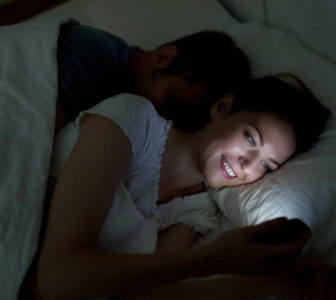 As a society, we’ve become more attached to our smartphones over the last few years. Whether we’re checking them to send a work email, check sports scores or text a friend, we rarely go anywhere without our phones. That sentiment is even more true for children and teenagers. However, new research suggests that those same smartphones could seriously be jeopardizing the quality of their sleep.
As a society, we’ve become more attached to our smartphones over the last few years. Whether we’re checking them to send a work email, check sports scores or text a friend, we rarely go anywhere without our phones. That sentiment is even more true for children and teenagers. However, new research suggests that those same smartphones could seriously be jeopardizing the quality of their sleep.
That finding isn’t all that surprising, as we’ve shared some tips for achieving quality sleep on the blog in the past. One such way was to turn off your devices when you crawl into bed, be that your smartphone, Netflix or your iPad. However, the new findings showcase more evidence as to just how detrimental smartphones are to a teen’s quality of sleep.
Smartphones and Sleep
A couple of the major findings from the study include:
- More than two-thirds of high schoolers sleep next to their smartphone or tablet, and almost half of them say they wake up at least once per night to respond to a message or a text.
- 72 percent of children and 89 percent of adolescents have a phone or tablet in their bedroom at night.
- About 40 percent of children will have poor sleep quantity and quality if they use a phone before bed.
- 13 percent of kids who use a phone before bed reported excessive daytime sleepiness, compared to 5 percent of kids who don’t use a phone before bed.
Researchers stated that poor sleep quality could be linked to a number of different factors related to the phone instead of simply using the phone itself. For example, they postulated that a teen’s sleep quality could be affected by the subjects of the messages sent/received, or how games on the phone can stimulate the mind at a time when it’s trying to relax and decompress.
Whatever the reason, the bottom line is the same – smartphones in the bedroom are affecting the quality and quantity to the sleep we receive. Parents should consider setting guidelines to prevent their children from using their phones throughout the night if they want them to get the best sleep possible. Since I know plenty of adults who do the same, parents should start by leading by example!